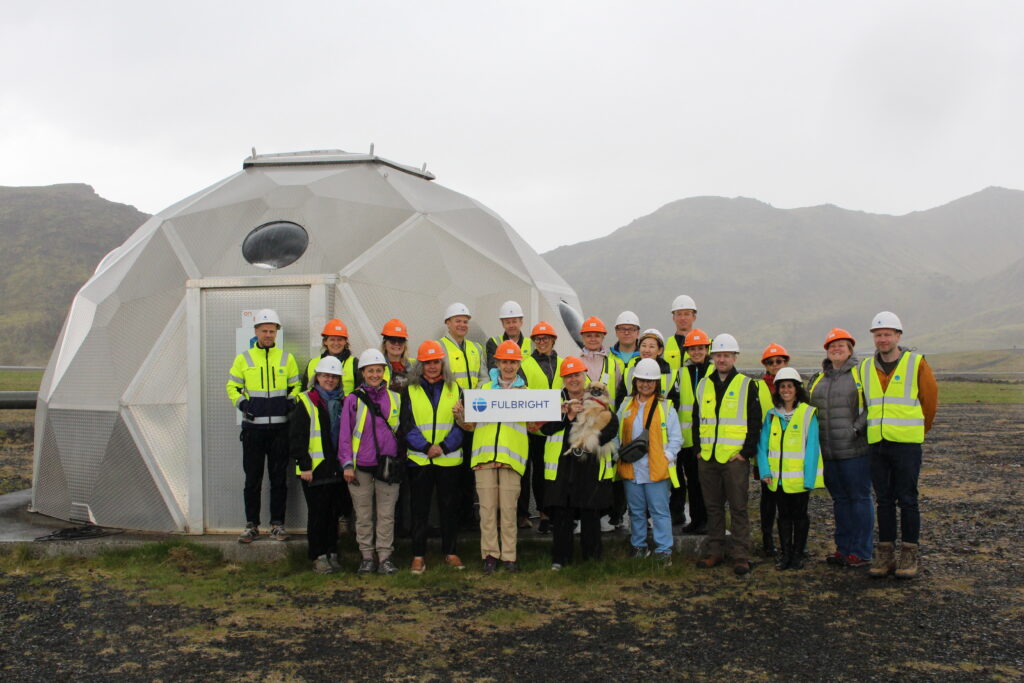
Since 2015, the Fulbright Arctic Initiative has sustained research and community engagement on high-priority policy issues in the Arctic region, such as security, energy, and the environment. This collaborative model has produced meaningful scholarship and policy recommendations, benefiting both local and international stakeholders. The program emphasizes collaborative scientific approaches that center the experience, knowledge, and input of Indigenous communities. Research from previous cohorts has been published in journals such as Elementa: Science of the Anthropocene and Scandinavian Journal of Public Health, laying out best practices for conducting community-based research.
The findings of Fulbright Arctic Scholars have also been presented to government officials both in the United States and abroad. In 2023, Scholars delivered the policy implications of their research to representatives of the Standing Committee of Parliamentarians of the Arctic Region (SCPAR) and Alaskan Senator Lisa Murkowski at an event hosted by the Embassy of the Kingdom of Denmark.
Building on the success of the previous three cohorts, a new group of twenty outstanding scholars have been selected for the fourth iteration of the Fulbright Arctic Initiative (FAI IV). These scholars, each from an Arctic nation, will collaborate on multi-disciplinary research over the next 18 months. Through this research, the new cohort will advance the shared interest of Arctic countries in building a secure and stable region.
The cohort will be led by two scholars who are also alums of previous years of the Fulbright Arctic Initiative, Dr. Elizabeth Rink, Professor of Community Health in the Department of Health and Human Development at Montana State University, and Dr. Lill Rastad Bjørst, Associate Professor of Arctic Studies in the Department of Culture and Learning and Scientific Director of Green Societies at Aalborg University in Denmark.
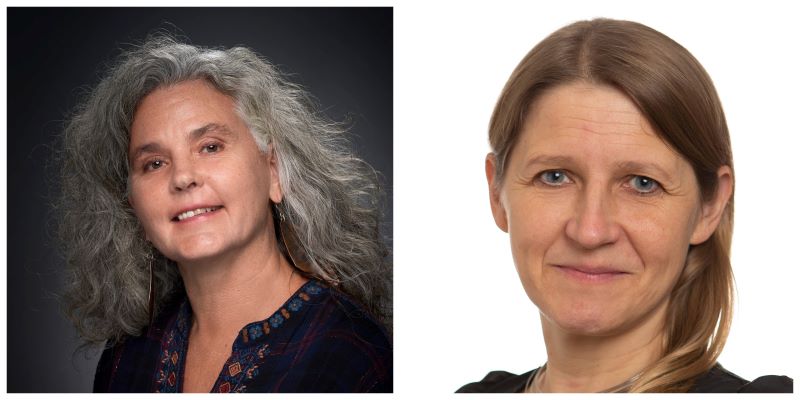
Dr. Rink and Dr. Bjørst remarked on the significance of the many “early-career scholars with the eagerness to work across disciplines” joining many seasoned Scholars. They note how this cohort represents “both Indigenous and non-Indigenous voices on public policy research questions relevant to Arctic nations” and that they “bring unique scholarship from all over the Arctic – both as experts and citizens.”
More information about the application process and details about the award can be found at Fulbright Arctic Initiative | Fulbright Scholar Program (fulbrightscholars.org) along with longer biographies of the 20 Fulbright Arctic IV participants:

Gabriella Argüello, Sweden
Dr. Gabriela Argüello, PhD, is a legal scholar at the University of Gothenburg, investigating offshore large-scale wind power deployment and carbon capture sequestration in the sub-seabed. She specializes in marine environmental law and ocean governance, with a focus on global environmental challenges involving states, international organizations, industries, and civil society organizations. As a Fulbright Arctic Scholar, she will conduct research in the United States on biological diversity and ecosystem-based governance in the Arctic Ocean.
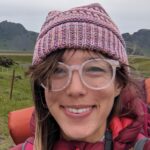
Mia Bennett, United States
Dr. Mia Bennett, PhD, is an assistant professor at the University of Washington–Seattle. She researches the geopolitics of infrastructure development in the Arctic and orbital space, with a focus on Indigenous empowerment, the influence of Asian political powers, and the dawn of satellite observations. As a Fulbright Arctic Scholar, Bennett will work with Indigenous and local northern communities in Norway to understand the impact of Arctic military infrastructure and development.

Wayne Clark, Canada
Dr. Wayne Inuglak Clark, EdD, ᐅᐊᐃᓐ ᐃᓄᒡᓚᒃ ᑲᓛᒃ is an assistant professor of psychiatry and the director of the Wâpanachakos Indigenous Health Program in the Faculty of Medicine & Dentistry at the University of Alberta. He is a registered Inuk of the Nunavut Agreement. His research addresses Inuit health services utilization trends, Inuit data sovereignty, and Indigenous medical education. As a Fulbright Arctic Scholar, he will conduct research in the United States on improving circumpolar assessment and innovation for Inuit mental health.
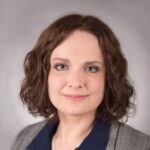
Karen Everett, Canada
Dr. Karen Everett, PhD, is a senior research associate at the Université Laval, researching socio-economic inequalities in the circumpolar Arctic. She focuses on the intersections between security, governance, and socio-economic inequalities and what this means for policy development. As a Fulbright Arctic Scholar, she will conduct research in the United States for a project on comprehensive security and governance.

Penny Gage, United States
Penny Gage is a managing director at Launch Alaska, an Anchorage, Alaska based nonprofit, where she leads their policy and advocacy work to advance the energy transition in Alaska and oversees an accelerator program to help companies from across the world deploy their technologies in Alaska. She is Tlingit Alaska Native and a member of the Sitka Tribe. As a Fulbright Arctic Scholar, she will conduct research in both Sweden and Norway on adapting Nordic clean tech success to Alaska’s energy transition.

Sappho Gilbert, United States
Dr. Sappho Gilbert, PhD, MPH, is a postdoctoral research fellow at the Harvard T.H. Chan School of Public Health. Her research interests include community health, food security, population nutrition, public policy, and environmental factors in the Arctic, investigating timely questions at the interface of public health, food systems, environmental science, Indigenous and local knowledge, and policy. As a Fulbright Arctic Scholar she will conduct research in Canada on nutritional health and psychological distress among young adults in the Canadian Arctic.
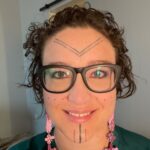
Heather Gordon, United States
Dr. Heather Sauyaq Jean Kwamboka Gordon, PhD, is a scholar of Indigenous studies, the owner and principal consultant at Sauyaq Solutions, and an adjunct faculty member at American University. She works with Indigenous Nations and communities on research, evaluation, and technical assistance in support of human rights and environmental justice. She is Iñupiaq and an enrolled Tribal member of the Nome Eskimo Community. As a Fulbright Arctic Scholar, she will conduct research in Finland and Canada on policies that can inform U.S. federal policy around land and water management through Indigenous governance.
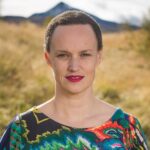
Rachael Lorna Johnstone, Iceland
Dr. Rachael Lorna Johnstone, SJD, is a professor at the University of Akureyri. She specializes in polar law, focusing on the governance of the Arctic and the Antarctic under international and domestic law. She has published widely on extractive industries and public participation, the rights of Indigenous peoples, human rights law, and environmental law in the polar regions. As a Fulbright Arctic Scholar, she will conduct research in the United States for a project on delivering a just energy transition for the Arctic.

Tanja Joona, Finland
Dr. Tanja Joona, PhD, is a senior researcher at the Arctic Centre of the University of Lapland. Her research focuses on comparative legal and political aspects of Indigenous Sámi society. She specializes in issues dealing with traditional livelihoods, energy transition, and land use, as well as international human rights law and identity questions in the context of justice and equality. As a Fulbright Arctic Scholar, she will conduct research in the United States on ensuring a “just green transition” outlining how the costs and benefits of a transition to a green economy can be equitably shared.

Juho Kähkönen, Finland
Juho Kähkönen is a researcher in international relations and international law at the University of Lapland. He focuses on Arctic politics law. Prior to his academic career, he led two large EU consortiums on energy transition and mining, and has published widely on security, tourism, and Arctic logistics. As a Fulbright Arctic Scholar, he will conduct research in the United States on the future of Arctic logistics and transportation.
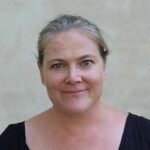
Anna Karlsdóttir, Iceland
Dr. Anna Karlsdóttir, PhD, is a professor of human geography and tourism studies, life and environmental sciences at the University of Iceland. As an arctic social science researcher, she conducts policy-focused research on regional development with an emphasis on rural regional development and its implications on wellbeing and prosperity and the Arctic. She has worked with the Nordic Council of Ministers Research Organisation on regional development and planning (Nordregio) and the Nordic Arctic Working Group. As a Fulbright Arctic Scholar, she will conduct research in the United States on the development of tourism in the Arctic to enhance resilience.
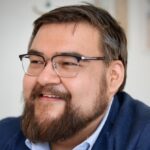
Hans Peder Kirkegaard, Kingdom of Denmark
Hans Peder Kirkegaard is a former diplomat and a special advisor in Defense and Security Policy at the Government of Greenland’s Ministry of Foreign Affairs. He is currently researching the cooperation between politicians and the intelligence community at the University of Greenland. As a Fulbright Arctic Scholar, he will investigate the risk of foreign malign influence operations among Indigenous communities.

Adam Lajeunesse, Canada
Dr. Adam Lajeunesse, PhD, is an associate professor and chair of the public policy and governance program at St. Francis Xavier University. He also directs the Canadian Maritime Security Network (CMSN), a Department of National Defence-funded research network. He is the research coordinator for the Naval Association of Canada, a research associate at the Centre for Military and Strategic Studies, and a fellow at the Canadian Global Affairs Institute. As a Fulbright Arctic Scholar to the United States, he will conduct research on disinformation and malign influence in a contested Arctic.

Alexandra Middleton, Finland
Dr. Alexandra Middleton, PhD, is a researcher specializing in sustainability, corporate social responsibility, and Arctic business development at the University of Oulu. Middleton has engaged in science diplomacy to raise awareness of the Arctic’s economic, social, and environmental challenges. Currently, she serves as the Citizen Science Ambassador for Finland in the European Citizen Science Project. As a Fulbright Arctic Scholar to the United States, she will conduct research on energy security and critical minerals management.
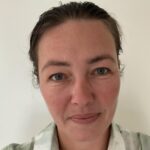
Rikke Østergaard, Kingdom of Denmark
Rikke Østergaard is a researcher in Arctic Studies at the University of Greenland – Ilisimatusarfik, studying how major challenges in Greenland are shaped by power structures that lead to systemic inequalities. She was previously a research coordinator at the Joint Arctic Command in Nuuk, focusing on civil and military cooperation. As a Fulbright Arctic Scholar to the United States, she will focus on gender issues related to defense and using intersectionality to develop inclusive security policies in the Arctic.

Åsa Rennermalm, United States
Dr. Åsa Rennermalm, PhD, is a geography professor at Rutgers, The State University of New Jersey. She specializes in the hydrology and glaciology of the Arctic region, focusing particularly on the Greenland ice sheet and its response to 21st-century environmental factors. Her work examines the interactions between the Greenland ice sheet and the surrounding oceans, aiming to better understand and predict changes to the ice sheet. As a Fulbright Arctic Scholar to Denmark, she will conduct physical science research into arctic resources and the environment.
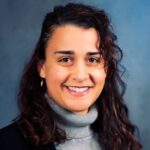
Mariah Seater, United States
Mariah Seater, MPH, is a public health researcher at Tulane University. She also serves as a special assistant to the Commissioner of the Alaska Department of Family and Community Services. She has held pivotal roles such as Health Equity Advisor with the CDC Foundation, Program Coordinator for Alaska’s COVID-19 Vaccine Task Force, and Public Health Specialist with Volunteers of America Alaska, where she worked on enhancing program service delivery and fostering community partnerships. As a Fulbright Arctic Scholar, she will conduct research in Iceland on family justice centers in Arctic communities.
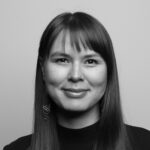
Ivalu Katajavaara Seidler, Kingdom of Denmark
Dr. Ivalu Katajavaara Seidler, PhD, is an Indigenous scholar from Greenland, Kingdom of Denmark, who is affiliated with both the University of Southern Denmark and the University of Greenland. Her research is focused on mental health, suicide, and alcohol with an epidemiological approach. She seeks to create culturally sensitive ways of collecting and analyzing national data, working to ensure that every child can experience a safe and happy childhood. As a Fulbright Arctic Scholar, she will conduct research in the United States for her project on expanding Indigenous methodologies to assess and monitor mental health and well-being.
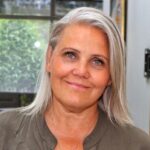
Sigrun Sigurdardottir, Iceland
Dr. Sigrun Sigurdardottir, PhD, is a professor at the University of Akureyri and a co-founder of the university’s Research Center against Violence. She has served as a police officer in rural areas of Iceland in addition to working as a nurse in Iceland’s public health service, mental health unit and rehabilitation service. Her research focus is on psychological trauma, violence, childhood sexual abuse, with a holistic and multi-disciplinary approach, and she teaches courses on trauma and violence. As a Fulbright Arctic Scholar, she will conduct research in the United States on a trauma-informed approach to mental health and well-being, stress, and suicide prevention.
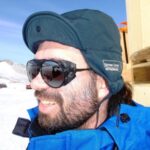
Lars Smedsrud, Norway
Dr. Lars H. Smedsrud, PhD, is a professor at the University Centre in Svalbard (UNIS) and the University of Bergen, where he leads a network for polar researchers. A polar physical oceanographer with a broad international network, he has conducted extensive field-work in Svalbard, the Barents Sea, the Arctic Ocean and Antarctica. He has been part of the EU-PolarNet project, and other major research collaborations. As a Fulbright Arctic Scholar, he will return to the United States to conduct research on tracking icebergs.
The Fulbright Program is sponsored by the U.S. Department of State, Bureau of Educational and Cultural Affairs with funding provided by the U.S. Government. The Institute of International Education administers the Fulbright Arctic Initiative. The governments of Canada, the Kingdom of Denmark, and Iceland have provided additional funding for the fourth cohort of Fulbright Arctic Scholars.